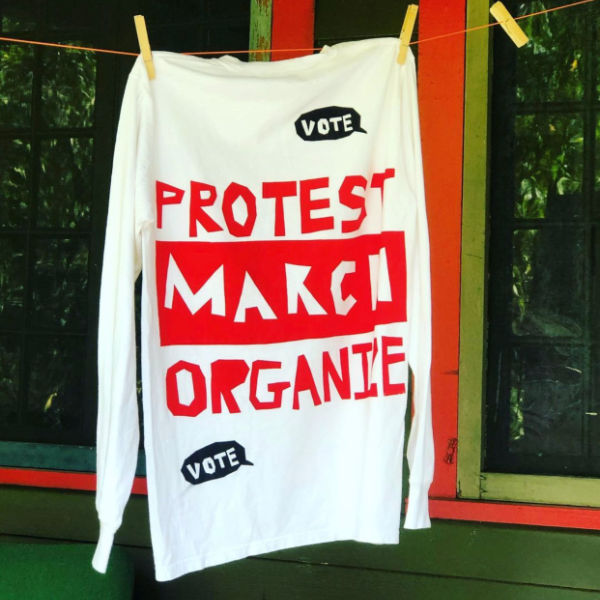Photographs courtesy of Lucky Fish
The entire world has changed this year. In the United States, the changes — and push for profound transformations — have felt especially intense. Between the pandemic, the Black Lives Matter movement specifically, and political unrest more generally, the way we live and work, and for many of us, the way we think about our societal structures more broadly, there is a before-COVID paradigm, and a post-COVID paradigm.
This sense of uncertainty and unrest feels familiar to Jann Cheifitz. These days, Cheifitz is the creative director of Lucky Fish in Brooklyn. But she was born in South Africa and honed her creative skills and activist acumen during the height of Apartheid. Her work in South Africa, and later in Brooklyn, has tied art, life, and ideology together and shows a continued belief in hope and healing amidst chaos and strife.

Lucky Fish founder and maker Jann Cheifitz
We wanted to find out more about her creative process, and how she believes activism and art are connected. Please read on for Cheifitz’s thoughts.
NEW YORK MAKERS: Tell us about how you first linked protest to your art work in South Africa.
JANN CHEIFITZ: In South Africa, it’s totally normal to blend arts, crafts, and activism. As a student in the 1980s, we used art as just one tool in our fight against oppression. I taught silkscreen printing in workshops at an art school with the goal of training others in art but also activism. The society was very different there.

Silkscreen poster "The people cry out." South Africa 1986
NYM: When did you come to the U.S., and did you immediately set out to become an artist-activist?
JC: I came to the U.S. in the early 1990s, but it became immediately clear that art and activism were seen as two completely separate categories here, so I abandoned art for some time as a career. But after having children and traveling widely, I saw an opportunity. I started making cute hand-screen printed t-shirts for my kids, and people absolutely loved them. I started making them for my friends and their kids, and a store owner on a beach we were vacationing at asked me to make some to sell in her store. I started printing t-shirts in a garage, using the hand-screen techniques I’d learn, and inspiration gathered from nature, culture, and travel.

NYM: Do you see activism as a part of your process or inspiration?
JC: I don't want to attempt to answer that for a new generation of artists and activists, but I'm working from my previous experience in Apartheid South Africa — trying to use my skills and techniques in ways that support and give visual expression to the ideas of a very broad movement that has emerged in response to a situation of intolerable oppression. At the moment, I'm printing t-shirts to raise money for the elections, and during the height of the protests against racist police killings, I did a zoom screen-printing workshop for people to make media in line with that protest. I'd like to do more skills-sharing in future.

Pre-pandemic
I've done anti-racist struggle media in South Africa many years ago, and my values now are the same as those I held then. I think we all have an obligation to do whatever we can to help the movement fighting structural racism, be mindful of the fact that this is a movement that speaks for itself and is led by young people from the communities most affected. So, we need to take our lead from them.
NYM: We’re craft nerds here. I’m curious: how does your printing process work?
JC: All pieces are hand-printed in small batches in local Brooklyn t-shirt print shops. I still like to do a little bit of printing myself. For production, we work with a photo silkscreen process, industry standard, but recently I have been re-exploring very basic stencil techniques, like paper cutting and hand-painted stencils. We mostly use water-based textile inks, some bleach inks, foil printing, and as little plastic inks as possible. I have started to explore combining textile inks with natural dyes going forward. The design process is a combo of photoshop, collage, painting, drawing, scanning, and old-school cut and paste. I love to use the screens for sampling and for doing different special one-of-a-kind pieces.
NYM: Your masks are really fun. When did you launch the line?
JC: I probably started making animal canvas masks about six years ago. I’m going to be expanding on these. Have you seen the smile one? For grown-ups — nobody can see our smiles behind the COVID masks, after all! The animal ones work for both kids and adults. These are dress-up masks. These are printed on canvas and sewn by hand in Brooklyn. We also have a simple t-shirt [COVID] mask with a print for kids and adults.
Shop Kids' T-Shirt Face Mask >>

NYM: Speaking of COVID, it has transformed many people’s work habits. How have yours changed?
JC: I've always outsourced all the production printing to a couple of small print shops that I work with in Brooklyn. That has remained constant. The main printer works alone, and he has managed to keep up with the workload but we are slowed down. It's frustrating. I used to have a lovely, big studio by the Navy Yard, but by the time I managed to get everything home that I needed to work and it was possible to go back to the studio, I found I didn't want to. I put the studio in storage and moved with the essentials. I've been staying Upstate since the summer, in a cabin on the Delaware [River]. It's beautiful. I'm working from here for now — it's a crazy cabin, full of art making and box packing and fueled by a wood stove. I think all the items might smell slightly of smoke these days.

NYM: How has the pandemic affected your business?
JC: Business has shifted from wholesale to more direct to consumer sales. Business is probably down numbers wise, but I have cut my overhead, so hopefully that won't be a problem. Some stores are thriving and some struggling, but without being able to do wholesale trade shows it's hard to transition to online sales only. Trying to figure that out. I miss that point of connection with my customers!
Shop Adults' T-Shirt Face Mask >>


We miss connecting with creators in person too. Thankfully, Lucky Fish makes being hopeful about sunnier days ahead, much easier.


Leave a comment